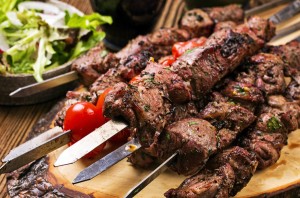Let’s face it: we all like going out to eat at a nice restaurant once a while – for some, more than others. Sometimes the food is worth the price, while during other occasions we ask ourselves if the meal was even worth the $30 (plus tip). Well, according to a new study, our liking of the taste of food really depends on the price.
Researchers in nutrition, economics and consumer behavior from Cornell University visited an Italian buffet in upstate New York and observed the habits of 139 diners when they had revised the price of the buffet. Patrons had the option of either a $4 or $8 buffet and were then asked to rate their experience on the food, restaurant and their first, middle and last taste of the food based on a nine-point scale.
 At the end of the meal, the customers who opted for the $8 buffet enjoyed their food 11 percent more than the individuals who chose the $4 buffet – nothing was different: the two groups ate the same food.
At the end of the meal, the customers who opted for the $8 buffet enjoyed their food 11 percent more than the individuals who chose the $4 buffet – nothing was different: the two groups ate the same food.
In addition, those who paid a lower price for the buffet believed that they had overeaten, felt more guilt about the meal and disliked the food more and more throughout the courses of the meal.
The study suggested that taste perception and feelings of overeating and guilt can be influenced by the price.
“We were fascinated to find that pricing has little impact on how much one eats, but a huge impact on how you interpret the experience,” said Brian Wansink, Ph.D., a professor at the Dyson School of Applied Economics and Management at Cornell University, in a statement. “Simply cutting the price of food at a restaurant dramatically affects how customers evaluate and appreciate the food.”
The researchers were surprised at the trends in the study: “If the food is there, you are going to eat it, but the pricing very much affects how you are going to feel about your meal and how you will evaluate the restaurant,” said Ozge Sigirci, a researcher at Cornell University Food and Brand Lab and study author.
The purpose of the study was not to address the issues of public health – officials and health experts argue that all-you-can-eat buffets contribute to the problems of overeating and obesity and have called for special taxes on buffets. However, the scientists did conclude that if a diner wants the best possible experience at a buffet then choose one that is the most expensive.
The results of the study were presented by Sigirci on Tuesday during the Experimental Biology 2014 at the Community and Public Health Nutrition: Food Environment and Food Systems poster session in San Diego.
If a restaurateur or a chef wants to operate a successful buffet business that generates spectacular reviews then it could very well be prudent to start hiking the prices. However, if a person is on a diet, a little bit overweight or doesn’t want to feel overly full after a meal then perhaps they should ignore any restaurant that has the sign: all-you-can-eat.



